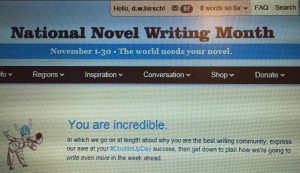‘Tis the season.
What does your season look like?
It’s December, and I’m running around with holiday madness. I don’t have the time to remember my gift list let alone what I did or didn’t accomplish this year. In fact, if hadn’t written them down, I’d have forgotten I even had thoughts to change my world.
I don’t believe in resolutions. Too often they’re wishes without a specific plan for success. That’s why I embraced my writers’ group commitment to three Non-Resolutions for 2015. The challenge was to identify the “specific and concrete” steps to “improve yourself as a writer.” I did this thinking it a simple challenge something specific and easy it’s the end of the year, tis the season to look ahead while looking back. so I share my successes and failures in life, the universe and everything else.
How did I do? Let’s just say I take ownership of my actions and my non-actions. These were my commitments:
1.(A) Find an editor and (B) publish my memoir before June 2015.
Nope. Nope, nope, nope. Not even close. Every time I sat down to edit, thinking the book just needed some tweaking, I found a jumble of sentence fragments and missplelled words instead. I suspected that organizing the non-chronological series of vignettes was the problem. I came up with creative ways to procrastination. I read blog posts by fiction and nonfiction writers to learn how they handled organization. I read a memoir to see how it was organized. I found checklists to follow, but still my story didn’t flow.
That got me thinking about format and tools to ease my struggles. I purchased Scrivener, a software program has a “corkboard” to organize my thoughts and scenes so I can rearrange as often as needed with a swift swipe of my mouse. This is a useful procrastination, I told myself. I spent two weeks slugging through the detailed tutorial and then hit a snag with the program. I set it aside in frustration to continue after November’s NaNoWriMo. It’s December and is still untouched.
2.Explore at least one new book/genre and revisit an old favorite.
This was a flop. Aside from reading that one memoir early in the year, I didn’t finish another book.
I started what I presumed was “an old favorite” but it wasn’t as interesting as I remembered. I found a sci-fi book that both Mom and I read. I committed to read it at night, maybe not every night, but I put it and a spare pair of reading glasses on my nightstand for convenience. The only space available was at the edge, so the book is too far to reach, and my clumsy, ill-fitting dollar store glasses are awkward to wear. I have made reading more complicated than it should be.
3.Set aside time to journal at least once a month.
I accomplished this! I may have skipped weeks at a time, but I wrote more, that I know. That I feel. I mingled my thoughts with blog posts and ideas, sprinkled between to-do lists and notes from writers’ conferences and meetings. I rediscovered that I write more fluidly by hand, so I spent more time journaling just for the fun and love of writing on paper. Writing by hand is organic to me, so I will keep journaling.
Nothing is truly a failure. These commitments did not need to be complete, nor did they need to be completed for me to succeed. I learned about myself and gained some valuable perspectives and insights into my actions.
What did I learn?
I need to break my writing and editing tasks into smaller snippets and set a timer. Tell myself “Tuesday morning, research editors” and allot 27 minutes only. I’ll know at the end of the timer I’ll either need a break or feel inspired to keep working. It’s how I survived and won NaNoWriMo.
In 23, 27 or 33 minute segments, I wrote 50,721 words in the last 20 days of the months. I started on November 11, so this equaled 2500 words/day which for me was about 1 1/2 hours per day. That means I can find the time to write because I have the time when I’m not distracted by Major Crimes on TV or Angry Birds on my phone. I remind myself of this daily because not only is it motivating but because in the madness of the month, I discovered a 25,000-word story, a complete one that I can actually work with and interests me. I consider the purchase a distraction and a success. I can use Scrivener to organize this book as I edit to publish by the end of 2015, a swift spellbinding sequel to my initial Jimmy the Burglar book.
Getting back to my roots of handwriting gave me the opportunity to see what I was thinking. Words on paper, written by my hand, helped me focus on what I want to do with my writing. I will change the focus of my blog to include more writing, insights, interviews and inspiration. Posts on Deadwood Writers Voices may change. I want to entertain my readers, offer them something worthwhile, while writing topics that excite my passion and enthusiasm. I’m exploring what those topics may be.
As for reading books, I will purchase a better pair of reading glasses.
